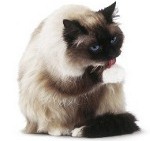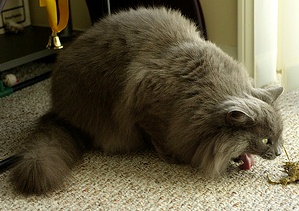Cats are good at keeping themselves clean with fastidious grooming, but, in the process, they swallow loose hairs. These hairs are indigestible and usually pass through the body. If the hair accumulates in the stomach, though, a hairball will form,  and your cat will retch to bring it up.
and your cat will retch to bring it up.
Cats in the wild don’t have problems with hairballs, and they not only groom themselves but they also swallow the fur of their prey. These wild cats have no problem with hairballs because their diet includes raw bones, raw meat, and natural roughage that moves the hair through the digestive tract and out of the body.
Hairballs are more apt to happen during shedding season in long-haired cats and cats who groom others, particularly if the cat is not on a natural diet.  An occasional hairball is nothing to worry about, but if your cat retches up hairballs on a daily basis, or even semi-weekly, the potential is there for a larger problem.
An occasional hairball is nothing to worry about, but if your cat retches up hairballs on a daily basis, or even semi-weekly, the potential is there for a larger problem.
Hairballs that won’t pass can cause loss of appetite, lethargy, defecation problems, or a bloated abdomen. Very rarely, hairballs can get severe enough that they block the throat, stomach, or intestines, resulting in death. Also, it’s possible that a hairball may have to be removed surgically, because the wad can become as large as an orange. If your cat is susceptible to hairball problems, you’ll want to take steps to prevent such a situation.
Herbal and Naturopathic Help
A common treatment prescribed by conventional veterinarians is flavored petroleum jelly, but holistic veterinarians do not recommend this. Studies have shown petroleum products suppress the immune system and cause cancer.
The best way to prevent a hairball problem is to feed a natural diet made of raw meats and raw bones, supplemented with finely minced vegetables and pet grasses, as described in the cancer prevention section. Adding olive oil or pureed pumpkin to the food may help, too.
Adding olive oil or pureed pumpkin to the food may help, too.
There is also a somewhat unconventional treatment called diatomaceous earth that may be worth looking into. Diatomaceous earth is a powder that has been used for a number of things including swimming pool filters. When it was being tested as an agricultural crop protectant, researchers did feeding tests on livestock to gauge how toxic or safe it was for affected farm animals. Surprisingly, the tests showed improved health in the animals fed the diatomaceous product.
The powder consists of diatoms, which are a microscopic hard-shelled algae. Apparently, diatoms remove worms and prevent infestation … and they prevent hairballs. If you are considering using diatomaceous earth, be aware that the powder is not to be inhaled. Doing so can cause lung damage, so be very careful with the powder. For more information, here is link to a website on food grade diatomaceous earth.
If your cat continues to have a hairball problem after you’ve switched to a natural diet and have tried theses remedies, see a holistic veterinarian for a thorough examination to rule out intestinal cancer or inflammatory bowel disease.